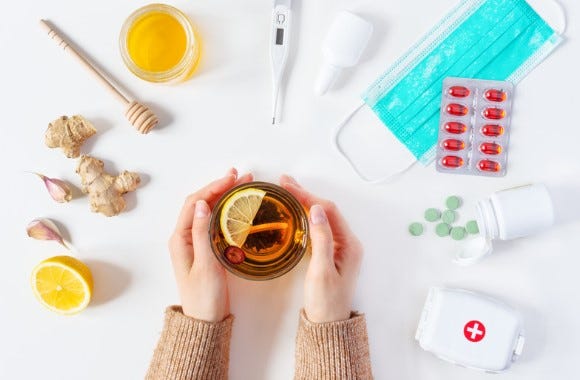Critical Immune-Boosting Nutrients for the Start of Cold Season
What you need to know as the cold-flu-Covid season approaches
The Naturalized Human is a weekly newsletter focused on our mind-body-food connection. I am currently working up the courage to add audio and/or video for some of the topics I am covering here. I’ve got some new equipment on order to help me branch out. . . I’ll start testing it as soon as it arrives. If this appeals to you, subscribe and hit reply to the welcome email or DM me with some encouragement and what you’d be most interesting in receiving in those formats. I’ll look forward to your input!
As the summer sun begins to wane here in the north, it’s time to start thinking about the fast approaching cold, flu, and Covid season.
Contrary to popular media, it is not normal to get sick every fall and winter. When our bodies are healthy and operating with all they need, our immune systems fight off minor infections with ease.
So what’s the difference between someone who gets every illness circulating in the community and someone who sails through season with rarely a sniffle?
Micronutrients and Cold/Flu Season
The latest revolution in medicine reflects our fast-growing understanding that our gut controls so much more of our health than previously understood. Just because you are eating certain foods, doesn’t mean you are benefitting from them UNLESS your gut “microbiome” is healthy and functioning.
Your microbiome is all the bacteria and micro-organisms that live inside your digestive system and help you digest food. If they aren’t doing their jobs, you can’t absorb the nutrients you need. Antibiotics, though necessary to kill some of the “bad guys” making you ill, also kills the good guys in your system that keep you well. Eating a diet high in ultra-processed foods narrows your gut microbiome which means you may not have the enough of the good types of micro-organisms helping you absorb critical nutrients.
A healthy diet of diverse and colorful plants, and enough of the essential animal-derived nutrients like B12, heme iron and Vitamin D3 (which is more absorbable than the D2 version found in plants).
A further challenge, even with healthy foods - and I have written about this before, is that even “healthy foods” like greens, peppers, broccoli and squash are only as nutrient-packed as the soil they are grown. The soil is devoid of healthy soil-microbiome then the plants are simply not as nutritious as expected.
A 2021 study published in the International Journal of Food Sciences and Nutrition used historical nutrient density data to demonstrate significant declines in the mineral content of key foods from 1940 to 2019 in the UK. Using carefully matched datasets and pair-wise tests, the researchers’ showed an overall 50% decline in iron content and 9.7% decline in magnesium in fruits and vegetables between 1940 and 2019, to name only a few micronutrients studied.
So this combination of your own microbiome status and the quality of the foods you eat (including the soil that food was grown on) all help determine if your immune system will be strong enough to fight off seasonal invaders and the boogeymen of illness.
What micronutrients are key for immune system function?
The “big ticket” immune boosting nutrients according to Current Opinion In Food Science-2022 include:
B complex - more specifically B6, B9 and B12
Vitamin C
Vitamin D
Vitamin E
Minerals - Zinc, Copper, Iron and Selenium
If your diet lacks these nutrients, then your immune system is simply unable to generate a sufficient response to suppress and overcome the first stages of a seasonal illness.
If you are vegan, then it is critical to pay attention to Vitamin B12, Vitamin D3, zinc and iron which are either unavailable from plants or more difficult to absorb from plant-only sources. If you get sick all the time, these would be the most critical nutrients to focus on and boost.
To supplement or not?
Although in theory it is completely logical that we can get all the nutrients we need from the foods we eat, the reality is that our food systems are no long field to table for most of us.
Unless you are growing all your food yourself, what you access from grocery store shelves has undergone processing/handling, storage, transportation and, in the case of fresh produce, chemical treatment to have it ready for sale (e.g. waxing, ripening, sprout suppression, etc.).
It’s easy to end up with deficiencies as well if you are under a lot of stress, lacking sleep, or have underlying health concerns.
Personally, I take supplements to help boost my intake of these key nutrients. But all supplements are not created equal. You can get cheap laboratory-derived versions of many nutrients like synthetic Vitamin C and ferric iron salts as supplements. However, if I am going to spend money on supplements then I look for natural or food-derived sources for the best absorption.
Vitamin C
What we commonly know as Vitamin C is a powerhouse nutrient that affects our ability to grow and repair tissues in the body. It is essential for the production of collagen, the absorption of iron, the wound healing reaction, the proliferation of immune T-cells, and the creation of antibodies.
In other words, without sufficient Vitamin C, your immune system is operating at a significant disadvantage.
While there is still ongoing debate as to whether Vitamin C can prevent a cold, there is substantial evidence that it can shorten the duration of a seasonal illness (ref-2024).
For me, the first sign of a tickle in my throat, sniffle or body aches sends me reaching for a Vitamin-C packed dinner recipe (something with bell peppers, tomatoes, citrus, or berries), a hot cup of lemon honey, or a high quality Vitamin C supplement. The sooner you react to the first symptom, the faster you can help your body fight it off.
While there is no known difference between lab-made or natural l-ascorbic acid in terms of how they react with other molecules, Vitamin C is not found alone in nature. In fruits and vegetables, Vitamin C comes packaged with other phytonutrients such as flavonoids, carotenoids, phenolic acid and so much more. So if you appreciate the value of eating whole foods, then to my way of thinking it makes sense to choose supplements derived from whole foods as well.
In this last year, I have turned to tinctures of elderberry and of rosehips as excellent sources of Vitamin C and immune-boosting goodness. I can make both of these myself from my plants on the farm giving me complete control over how these medicines were grown and created. Both have a long history in traditional medicine.
Iron
Iron is another great example of how absorption really matters in supplements. Most cheap iron supplements are based on ferric salts. They work to raise your blood-iron levels, but are often hard your body, resulting in constipation and other side effects.
In contrast, liver-based iron supplements contain heme-iron which is significantly more absorbable and unlikely to cause constipation. And like Vitamin C, liver as a natural high-iron food comes packaged with other nutrients. In this case, liver also comes with essential fatty acids, B12, Vitamin A and minerals like copper which can all help to improve your health.
Since I have struggled with anemia much of my life, I have come to value the boost provided by a simple dehydrated liver supplement rather than the harsher iron isolates.
Please note I am simply sharing my personal experiences here - I am not a medical doctor or nutritionists - so you do you. This is simply what my journey has looked like. For me, Vitamin C and iron are the two supplements that make a difference to me when I start to feel run down and like a cold is coming on.
Fall doesn’t have to mean getting sick
As we journey together here at The Naturalized Human and explore how our mind-body-food connections work, the most important thing to remember is that your body is designed to heal itself.
Your body already has the systems in place to flush out invading organisms, attack bacteria and virus, heal wounds, and repair damaged tissues.
Our job is really to provide that system with the building blocks it needs to enable those systems to be fully functional. If we are chronically short of the key immune boosters: Vitamins B, C, D, E and the critical immune minerals of zinc, copper, iron and selenium, then we are setting ourselves up for a struggle.
As people around you start to fall ill this fall, remember your best defense is always prevention. Wash your hands. Use social distancing or masking as needed. Eat a healthy diet packed with a wide variety of immune-boosting foods. Get lots of sleep. And manage your stress.
Key Immune Boosting Foods:
B complex: salmon, liver, beef, eggs, oysters, legumes
Vitamin C: berries, citrus, tomatoes, peppers, potatoes
Vitamin D: fish, mushrooms
Vitamin E: almonds, avocados, peanut butter, red peppers, fish
Zinc: meat, fish, seafood, beans (but absorption is low)
Copper: oysters, liver, beans, nuts, dark leafy greens, cocoa, black pepper
Iron: liver, meat, fish, eggs, tofu, beans, figs
Selenium: meat, fish, eggs, beans, soy, nuts, seeds
The above list is far from exhaustive, but rather just some examples of the top ranked foods in each category.
The key is to make sure you are including immune-boosting foods in your fall and winter meal plans.
DO you have a favorite go-to food when you start feeling sick? Share in the comments.
Subscribe to get The Naturalized Human in your inbox weekly






